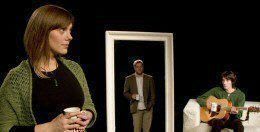Southwark Playhouse's Love in (3) Parts follows Paul (Rich W. Burton) and Claire (Sally Kent), a middle-class white couple, as their relationship progresses from awkward first date through all the surprises, arguments and reconciliations that follow.
So what is there to differentiate it from the morass of similar plays telling similar stories?
First, there's the inclusion of musician James Dey, who provides incidental and background music on guitar, keyboard and glockenspiel, as well as singing. Like the play as a whole, Dey's music is langorously, almost sleepily paced, especially for the first forty or so minutes of the seventy-minute production.
The whole affair is very relaxed and unhurried; there's very little tension, either in the production or the relationship it portrays.
Dey's instruments are cleverly built into various bits of Kath Singh's set, a contemporary black and white Everyflat. Dey himself ambles about the stage doing his own thing, for the most part invisible to the couple. Whether he has any relevance to the plot, or is simply there to add an extra musical dimension to the production, isn't made explicit until very late in the play.
This is symptomatic of the play's general tendency to spend too long setting things up and leave itself too little time to fully exploit the situations they bring about.
The other major example of this problem, and by coincidence the play's other major distinguishing point, is Paul's Obsessive Compulsive Disorder (OCD). He can't leave the flat without clicking the lamp on and off three times; he can't relax unless his pencils are lined up parallel on top of the television; and when he arrives home he has to fold his coat and scarf just so, and count out his loose change onto the sideboard.
Mostly this issue is used to demonstrate the play's central axiom, tabled by Paul during first date dinner: that at first you love a person's quirks, then they drive you mad, and eventually, when they're gone, you miss them.
But for too long we linger on the threshold between stages one and two, in which Claire finds Paul's rituals merely interesting.
It's a shame, because when they finally do drive her mad we're treated to the strongest scene in the whole play, in which Claire is driven to deliver a wholly unfair ultimatum - the "habits" or her - and enact it with unexpected cruelty.
It's the one time either character does anything at all unexpected. Paul's OCD notwithstanding, both are deliberately written as typical Everypeople. Neither one ever seems to strive for anything; they drift from one situation to the next as languidly as Dey's music, without actively embracing or resisting a single one.
There are plenty of little ideas and devices worthy of some praise: from the satisfying eventual resolution of Dey's ghostly presence, to the eerie moonlit ambience provided by the snowing television screen, to the well-observed and believable stumbles and false starts that break up the awkward, meaningless first date dialogue. Both performances, too, are surefooted, and thoroughly plumb what depths the characters do possess.
But ultimately the play needs more than little ideas in order to say anything about love that hasn't already been said the same way a thousand times. The best thing to say about it is it's nice. Not life-changing, but not bad either; just nice.
Until 31st January
